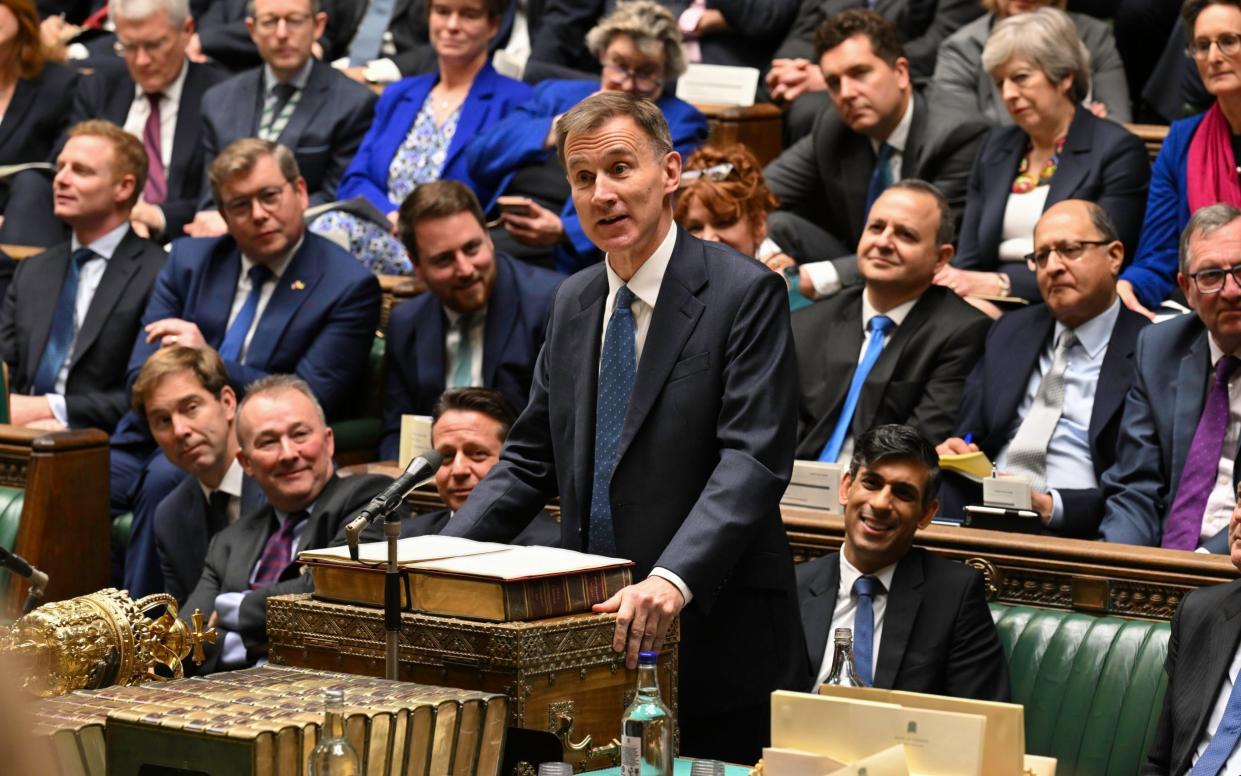Hunt slashes taxes to bring self-employment back to life

The self-employed are to benefit from a 1p cut to National Insurance that will leave them £350 better off a year on average.
The Chancellor said that slashing workers’ tax burden was part of the Government’s plan to “reward” hard work and boost economic growth.
The main rate of Class 4 self-employed National Insurance will fall from 9pc to 8pc – a tax cut that will affect an estimated 2.1 million workers. It will mean an annual saving of £117 for basic-rate taxpayers, or £322 for higher-rate taxpayers and £358 for those paying the highest 45p rate of income tax.
On top of this, Mr Hunt has also abolished Class 2 National Insurance – a flat rate that self-employed workers pay on profits of more than £12,570. The Government estimates that 1.9 million will benefit from the additional move, saving an average £186 per year.
The cuts, which Mr Hunt said were made “after careful consideration and in recognition of the contribution made by self-employed people to our country”, came alongside further cuts to National Insurance for employees.
The main rate of National Insurance paid by workers and employers, known as Class 1, will also be cut by two percentage points from January in a measure that will help 27 million workers and save someone on the average salary of £35,000 more than £450 a year.
The changes will also provide a significant boost to businesses who also contribute to National Insurance.
They have been called “an important acknowledgment” of a sector that has been in rapid decline since the pandemic.
Since the end of 2019, the number of people who work for themselves has dropped by around 700,000, with experts putting the exodus down to the rising tax burden and disruption to businesses caused by Covid.
Experts have also blamed the sharp drop in freelancer numbers, which during the previous decade had been on an upwards trajectory, on changes to so-called off-payroll tax rules known as “IR35”.
The rules mean that a worker using an intermediary, such as a limited company, must have their employment status assessed for tax purposes. If they are deemed “inside IR35”, the worker will be taxed as an employee – potentially cutting their take-home pay by 30pc.
Kwasi Kwarteng promised to abolish the IR35 regime during his brief stint as Chancellor last year under Liz Truss, but this decision was later reversed.
Recommended
National Insurance calculator: find out your new take-home pay
‘It’s a drop in the ocean’
Penelope Silver, who owns a Reiki healing business in Cheadle Hume, Greater Manchester, said the cut to national insurance was a “drop in the ocean”.
Ms Silver, 48, a single mother-of-two and the sole breadwinner in her family, said: “I’m not going to look a gift horse in the mouth, but in reality it’s not that much.
“Even if the cuts mean an extra £350, that’s not going to go very far, with all the money I have to spend on essentials.
“It’s a fortune buying food every week, with two teenage girls. The school bus alone is £300, so it wouldn’t even cancel that out.

As an entrepreneur, Ms Silver said she had ‘tough times’ when her daughters – Tasha, 18, and Charlotte, 16 – were younger, but she has since built up a successful businesses through hard work.
The rent on her three-bedroom house increases by 5pc annually, while heating bills have also soared.
Although she provides the basics for her daughters, they help her out by earning their own money to buy train tickets or clothes, as well as freelancing for her business.
“I am very mindful that the Government is kind of between a rock and a hard place,” she added. “But I don’t see how they can make this kind of situation better”.
‘Self-employed reeling from off-payroll rule’
Andy Chamberlain of the Association of Independent Professionals and the Self-Employed (IPSE), said the trade body was pleased the Chancellor had “recognised the vital contribution of the self-employed sector to the UK economy”.
However, he said the tax cuts would not undo what he described as the damage the Government had already done.
He said: “Whilst it’s a welcome relief to feel there is some support on offer from Government, the self-employed sector is still reeling from gaping gaps in support during the pandemic and the implementation of the off-payroll working rules, which have had a devastating impact on hundreds of thousands.”
Not all self-employed workers will benefit from the tax cuts. Seb Maley, chief executive of contractor insurance firm Qdos, said: “People working via their own limited companies – whether freelancers, contractors or consultants – pay minimal national insurance, due to how they tend to pay themselves via their businesses [in dividends]. Yet again, the Government has let these workers fall through the cracks when it comes to tax cuts.”
Dave Chaplin, chief executive of IR35 compliance firm IR35 Shield, said: “Jeremy Hunt today claims he focused on growth. If he is so focused on growing the economy, he should have unshackled the UK’s flexible self-employed workforce by repealing the unworkable and deeply flawed off-payroll legislation.”
How to avoid the common pension tax mistake catching 86 per cent of people
Recommended
How to avoid the common pension tax mistake catching 86 per cent of people

